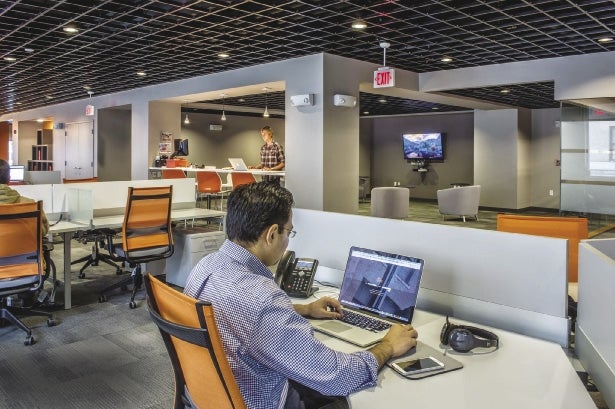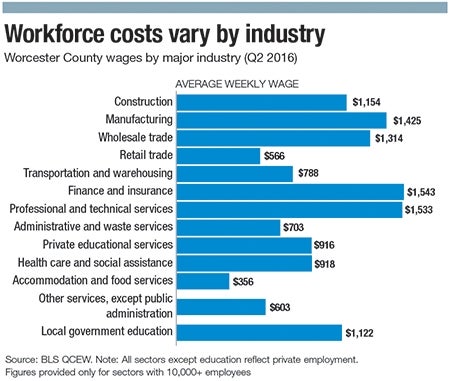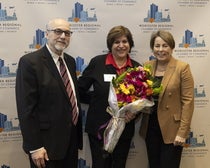Worcester County rising wages create complications
Pia Rogers, owner of the Sturbridge Coffee House, said she appreciates her employees, and she wants to make sure they make a good living. But she finds that balancing the need to pay well while also keeping her small business strong can be tricky.
As the state minimum wage has risen over the past three years, Rogers had to find more than $10,000 a year to pay for her growing employee costs, and lately she's been forced to raise prices – something she's taken pains to be open about with her customers.
“We explain to them that [the minimum wage] has gone up for the third time in three years,” she said.
An employees market
Wages in Worcester County have been slowly ticking up, rising 3.4 percent between the second quarter of 2015 and the same period last year, to an average of $992 a week, according to the U.S. Bureau of Labor Statistics. Between the rising minimum wage and increasing competition in a tightening labor market, employers are finding they need to find ways to pay more.
“They know if they want to get good employees that are motivated and have them stay, it's kind of an employees' market right now,” said Timothy Murray, president and CEO of the Worcester Regional Chamber of Commerce. “Good workers, both in terms of the specialized skills they have, or just in terms of soft skills, are at a premium.”
Murray said higher wages boost the local economy as workers spend more money, but it can be tough on employers.
David Crouch, president of Worcester software development company ten24 Digital Solutions, has been dealing with this issue for longer than many local business leaders. Unlike many industries, software never saw wages level off or drop during the Great Recession.
“It's a highly competitive market, so we're up against people … across the country who are paying top dollar and top benefits,” Crouch said.
A little over two years ago, ten24 moved from Northborough to Worcester in an effort to recruit talented young employees. That worked out well, Crouch said, but competing with high-paying firms demands some thought about what the company can offer workers.
“We're super flexible with things like vacations and work from home,” he said. “We understand they're not going to be making the same kind of wage they could make if they went to California or Boston, but we're going to be providing them opportunities where they can make a big impact and learn and help the firm grow.”
That's been enough to succeed in recruiting the two or three new people the company adds each year, Crouch said, and the people who do sign on seem to like what ten24 has to offer them.
“Since we moved two years ago, we haven't had anybody leave, which is a good thing,” he said.
Aging population & student loans
For the nonprofit healthcare and social services industries, there's a different set of challenges.
Mike Hyland, president and CEO of Sturbridge-based Venture Community Services, said raising wages can be hard because the organization gets most of its revenue from government sources like Medicaid. Unless reimbursement rates rise, it's difficult to give raises to direct care workers who provide services like home care for people with disabilities. The problem is poised to get tougher, with forecasts predicting major growth.
“That's because the population is aging,” Hyland said. “The fact is, we don't have enough people to do that work now.”
Even more concerning, Hyland said, federal officials are eyeing a possible change to the Medicaid program to transform the funding into a block grant for states, likely reducing the money available to pay workers.
Hyland said rising student debt is a concern, as it limits the options of new college graduates.
“In order to pay off student loans, they need to be working in an industry that pays more, or they need to work more than one job in this industry,” he said, adding the second option often leads to burnout.
Despite these issues, Hyland said rising wages are ultimately a good thing for workers and for the region.
“We're all in favor of higher minimum wages and stuff like that,” he said. “We need more money in people's pockets.”
Boston-level prices
Alexandra McNitt, executive director of the Chamber of Central Mass South, said companies' ability to respond to rising wages varies a great deal by geography and industry.
“If you're a large business netting profits in the millions of dollars, you're in a position to absorb that,” she said. “But that's not our world.”
Among her members in South Worcester County, McNitt said, most are sole proprietors struggling with issues like rising health insurance costs.
Meanwhile, potential employees see they could find better pay in the Boston area, or even in Worcester city.
“People in this area don't want to pay Boston prices for the products and services,” she said. “That's part of why people live out here. But employees are pretty much demanding that level, so that's causing some hardships on small businesses.”

















0 Comments